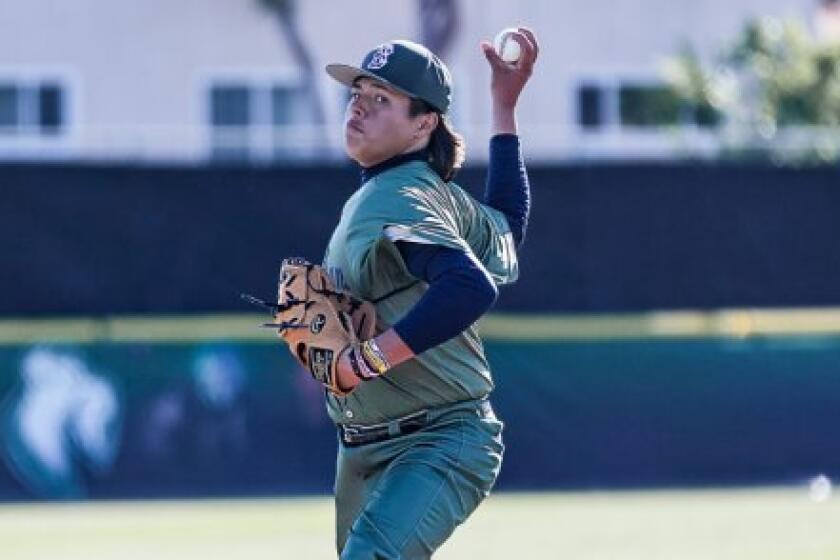On Personal Level, No Love to Be Lost
- Share via
Kirk Gibson meant a great deal to Dodger baseball in the brief time he was here, and for that I suppose we should be eternally thankful--almost as thankful as some of us are that Kansas City has taken him off our hands.
I have no use for Gibson as a human being, nor he for me, and it pains me to praise him. Nevertheless, the man is a proven winner, a proven clutch performer, a dedicated athlete and a warrior who responds to a drumbeat that only he can hear. When he played, he was some kind of player.
I have disliked Kirk Gibson since the very first moment I met him, which was in 1981, and I can still recall the last time I said a word to his face, which was 1988.
It was in the Dodger manager’s office, and Tom Lasorda’s eyeballs bugged right out of their sockets. His head swiveled back and forth as though he was at a tennis match.
Tommy was just trying to be nice, as is his custom, playing host.
“Mike, you know Kirk Gibson,” Lasorda said cheerfully, when suddenly only the three of us stood in the room.
“Mike won’t speak to me,” Gibson said.
“What?” Lasorda asked.
“Mike hates me,” Gibson said.
“Is that true?” Lasorda asked.
“Yes,” I said.
“Why?” Lasorda asked.
“From knowing him in Detroit,” I said.
“Mike hated Detroit,” Gibson told Lasorda.
“I didn’t hate Detroit,” I told Lasorda.
“He hated it,” Gibson said.
Poor Lasorda looked at me, then at Gibson, then at me.
And I took the bait.
“Why would you say I hated Detroit?” I asked Gibson.
“You left first chance you got,” Gibson said.
“Where the hell are you working now?” I asked.
And, of course, I was correct--Detroit hadn’t traded him, remember--but it didn’t matter, because he had succeeded. He baited me, same as he had before, same as he had many others. Gibson thrived on baiting people, on bullying them, on being confrontational just to see how they would respond, to see if he could get a rise from them, to see if they had guts enough to stand up to him.
It was what made teammates, journalists and strangers alike respect him, detest him or fear him.
I have seen him pull stuff in locker rooms that had players I did respect, say, Darrell Evans, turn away sorrowfully and mutter: “Class act, Kirk.” I have heard disbelief in the voices of dignified men such as Dan Petry and Larry Herndon, have seen sweet guys such as Alan Trammell and Chet Lemon react to something Gibson said or did as though they had spotted someone from Mars.
I’ve seen him climb outfield walls in Florida to avoid a dozen waiting fans with pens in their hands. I’ve seen him lean through the windows of a bus in New York and yell vile things at pedestrians on the street. I’ve seen him sneak up behind a teammate’s wife at 2 a.m. outside Tiger Stadium in Detroit and scare her--as a practical joke.
Yet this is the same Gibson who couldn’t tolerate the childish antics of Jesse Orosco in spring training at Vero Beach, messing with his cap and shaving cream and such, because baseball is serious business. “Establishing himself as a leader,” I think it was hailed at the time.
In Oakland, he browbeat a sportswriter with hostility and vulgarity until he reduced her to tears. In Kansas City at the 1984 playoffs, he swung his bat repeatedly behind the batting cage so that it would whoosh inches from my arm, and naturally it would have been my hard luck, not truly “belonging” there in the first place, had I moved six inches at the last second and had my elbow shattered.
He put on his polite face for certain people in Los Angeles, causing them in turn to wonder how anybody could have misjudged Gibson so. They should have heard the things he said behind their backs. To a Detroit writer who observed that Gibson seemed to be accommodating L.A.’s media, Gibson replied: “I don’t accommodate them. They accommodate me.”
As a player, he played hurt, if he could play at all. He was always hurt. He has the younger Mickey Mantle’s body--same power, same speed, same bones, same luck keeping them intact.
At his best, Kirk Gibson had uncanny ability. I once saw him drive a ball over a Boston center fielder’s head and catch up to Lou Whitaker, who was leading off second base. Whitaker was tagged out at the plate, but Gibson, running behind him, was safe. He bowled over the catcher and the umpire, and the baseball went flying.
He cleared roofs. He homered twice in the final game of the 1984 World Series; homered once, memorably, in the first game of the 1988 World Series. Were I a manager who needed a man with a bat in his hands, I’d want Gibson. I just wouldn’t want him standing beside me with it.
Detroit didn’t want him back. Tom Monaghan, owner of the Tigers, had not a kind word for Gibson after he left. And Gibson wore out his welcome with Fred Claire of the Dodgers, too. Sometime soon, maybe some of his teammates will go public with what they really thought of the guy.
The man could play baseball, I’ll say that for him. That’s all I’ll say for him. He left Los Angeles. Guess he must have hated it.
More to Read
Go beyond the scoreboard
Get the latest on L.A.'s teams in the daily Sports Report newsletter.
You may occasionally receive promotional content from the Los Angeles Times.










